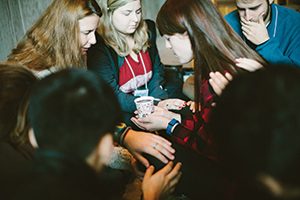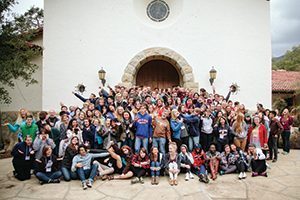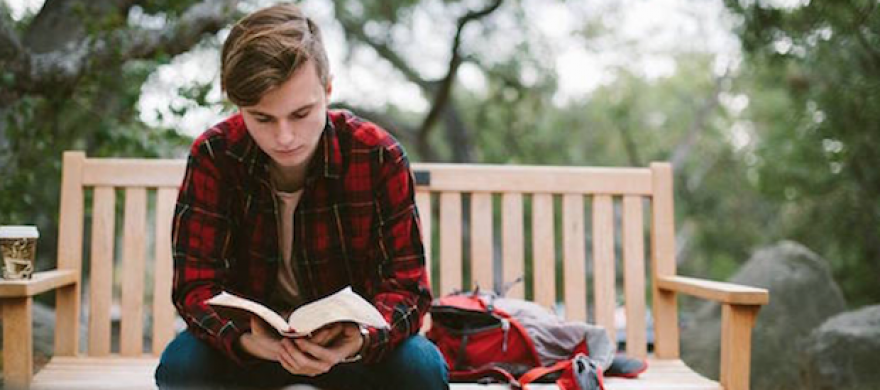Hideaway and Seek
Every winter, Pepperdine’s student ministers and leaders gather in retreat for restoration, renewal, and agape community.
You are a college student. New Year’s has just passed and you’re on a three-day weekend getaway at a resort in Santa Barbara, California, to get some R&R before hitting the books for the next semester. A young woman appears and gets your attention with a proposition to surrender your cell phone into a box that will be locked up for the weekend.
What would be your response? Anxiety? Relief? Terror?
But what comes with that proposition is a promise from Jesus. Hannah Parmelee (left) of the Boone Center for the Family leads a small group in
communion.
Hannah Parmelee (left) of the Boone Center for the Family leads a small group in
communion.
“Laying down your phone is not only a physical act of letting go, it’s also a symbolic
act of trust, of surrender—to truly find rest in Christ and experience his words,
‘Come to me all you who are weary and burdened, and I will give you rest,’” she explains,
to the group of 100-plus attendees at the Unplugged Retreat, a time of restoration
and spiritual formation organized by Pepperdine in 2013 to provide rest to students
who serve the University community as spiritual life leaders, campus ministers, and
soul care providers.
Held on the weekend before the start of the spring semester at the Casa de Maria retreat
center, the retreat suggests that while work is important, the value of rest is just
as important. Faculty and staff plan and execute the retreat entirely so that students
need only attend and be attended to.
Retreat organizer Stephanie Cupp (’94), program coordinator at the Center for Faith
and Learning, says, “To connect to God and undergird your ability to work well and
for the right reasons—to pursue your calling—cannot be done if you haven’t rested
in God, and thought, and contemplated, and worshipped, and all those other things.
That’s where Unplugged comes from.”
Removing the distractions that come through a student’s phone is where it starts.
And it can be hard. Jonathan Kwok, a Seaver College junior majoring in international
studies, is a spiritual life advisor (SLA) and has attended three retreats. He could
not give up his phone (it’s optional) for the first two, but he finally did this year.
“It made all the difference. To say ‘what do I want to do? I’m going to go for a walk
... just have God and me,’ it’s necessary to not have anything to fall back on.”
For Seaver junior Katie Park, a 2016 retreat attendee who is part of the student-led
ministry Koinonia Campus Mission, unplugging came a little easier.
“That was one of the reasons I wanted to go, to be unplugged,” she says. “But it’s
hard to do it alone. It was really encouraging because everyone else is doing it together—plugging
in with God and with a community that loves God.”
But just putting away phones in a beautiful location is not the only thing that Unplugged
offers. Like many spiritual retreats, there were numerous times of worship and a keynote
speaker and small-group discussions afterwards to unpack the messages presented.
Of the small group that she led, Hannah Parmelee, a director at the Boone Center for
the Family, says “I loved that time of getting to talk deeply about things and allow
space for vulnerability and hear their stories, insights, and challenges—it’s a really
rich time for them. It’s a joy to connect with students who love God and who are actively
pursuing him.”
Perhaps one of the most unique aspects of Unplugged is that it is an introduction
for students into Christian spiritual practices developed to focus attention on God—workshops
range from practicing the ancient Lectio Divina and labyrinth walks to “Experiencing
God Through Sweat.” One practice that everyone observes is “The Grand Silence,” in which the entire community
vows not to speak from 11:30 PM, Saturday night until mid-morning on Sunday. The attendees
take breakfast together in silence and it is a transforming experience for all.
One practice that everyone observes is “The Grand Silence,” in which the entire community
vows not to speak from 11:30 PM, Saturday night until mid-morning on Sunday. The attendees
take breakfast together in silence and it is a transforming experience for all.
“It was awkward at first,” says Park, “but they wanted us to be more present, so you
didn’t have to constantly worry about what’s going on in your head. Rather you think
how does this food taste—all you hear is food noises, utensils, plates. Our senses
were more heightened.”
Kami Bates, a Seaver senior, is a seasoned third-year SLA and has attended all four
Unplugged retreats and has watched it expand from primarily serving SLAs and campus
ministries. “This year it wasn’t only ‘spiritual leaders’—there were people from student
government, Inter-Club Council, and Intercultural Affairs,” she explains. “What I
have also seen is that the retreat has done a really good job of making space for
all personality types.” She credits Unplugged with being one of the most impactful
experiences at college. “Each year it seemed like it saved me, and saved me in different
ways.” As for her ability to cope with disconnecting? “I’ve gotten to the point where
I don’t even bring my phone. The bigger struggle is wanting to continue to be unplugged,
but not being able to.”
